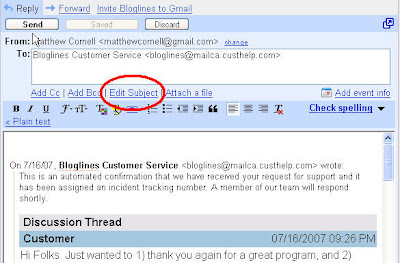I'm a grateful
Gmail user (my main email address forwards to my Gmail account), and I've been a satisfied user for the past few years. While I don't use Gmail to implement my
Getting Things Done system
[1], I've noticed four things that, if corrected, could increase productivity for all users. See what you think!
Make it easy to edit subjectsOne of the best practices for email
[2] is to edit the subject line of threads whose topic migrates. You know - it started out "let's bike this weekend" and after four times around it should be "here's Bob's phone #"! Doing this is possible in Gmail, but it's easy to miss because a) subjects aren't clearly shown, and b) the editing feature isn't obvious. Luckily, it's easy when you know where to look (see the screen shot to the right).
 Related
Related: Hanford Lemoore has a good summary of how confusing this is in
Gmail: Arrow of Mystery and Subject Line (scroll down to
The Subject line of Mystery).
Google's official instructions are here:
How do I change the subject of a message I'm replying to?Allow search without seeing the inboxOften I'll need to search messages while completing an action, but Gmail's "home" page when you start it is the Inbox. Why is this a problem? Because it's
sooooo tempting to just check the inbox - just for a minute - and then you've wasted tons of time and lost your focus.
Instead, it would be nice to configure Gmail to start somewhere else ("Contacts" or "All Mail"?) to avoid the allure. I've read that
Google Desktop lets you index Gmail messages, but I really like to avoid installing Windows programs if I can help it.
Simplify adding contactsRegarding contact systems, I strongly recommend that clients a) have one system to store names, address, emails, and phone numbers, and b) update them religiously (e.g., check and edit every time new data comes in). I use Gmail's
contacts feature for mine (prior to this I had them in three different places), but looking up and editing is quite painful.
For example, to look up a contact:
1. Click the quick contacts input box and type enough letters to pop up the desired contact.
2. Move the mouse down to the contact of interest.
3. Carefully move the most straight to the right.
4. Move right to "__'s profile."
5. Move right to "Contact details" and click.

Step 3. is very error-prone because it's so easy to slide off target at any point during the process (see the screen shot to the right).
Allow manual or longer retrieval delayAnother best practice to avoid the inbox's
siren's song is to change how often the program checks for new messages. The default is often quite frequent (I believe Outlook is 10 minutes, and Gmail seems faster than that), so it's smart to change it to be completely manual (i.e., you tell
it when to check), or at least setting it to wait longer between, say one hour.
Sadly, I could find no way to change this in Gmail.
Wrap upIf you think these changes aren't worth it, just multiply the number of Gmail users
[3] by time saved (say one minute a week per user?) by average $/hour, and you'll see some
very large savings are possible.
As always, I'd love to hear your thoughts. In particular, can you recommend good books on email? I've found a few
[4], but I've not read any of them.
References- [1] I track action in my paper planner (see Fare thee well Hipster PDA - I barely knew ye), and use the "Action Support" style of email integration.
- [2] When I talk about email in workshops, I say it's more "boot camp" than "charm school." By that I mean it's more important they learn a solid system for managing email (which is consistent with how they handle all the other stuff in their lives) before worrying about tips and tricks for making email communication more effective. The latter are important too, but need to come after the basics. That said, here are some great resources for once you've taken control of your inbox:
- [3] I couldn't find an official number from Google, but I've seen ~50 million in a few places (though that number is disputed to be too high).
- [4] An Amazon search turned up:
Related Gmail productivity tipsFollowing are just a few tips for practicing GTD within Gmail. Please share your favorites!
 Sunday, August 19, 2007 at 12:09PM
Sunday, August 19, 2007 at 12:09PM 


